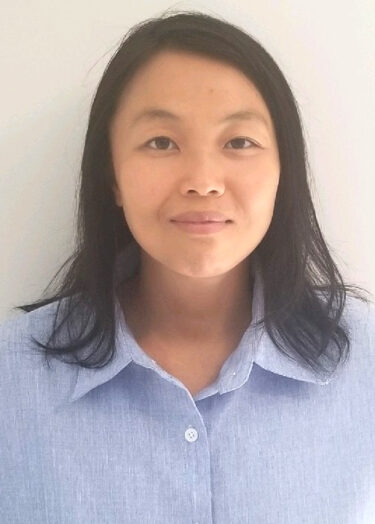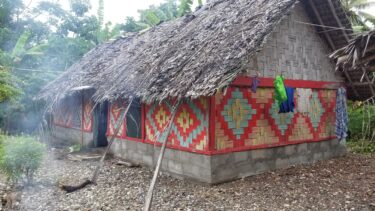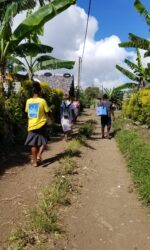There is a great need to invest in nursing and address global public health challenges, especially considering the health disparities illuminated by the Covid-19 pandemic.“Thinking about problems and their root causes really intrigues me,” said Nhia Yerkes-Vang, a public health nurse and current student in the UW School of Nursing Doctor of Nursing Practice program. “I like thinking big and figuring out how I can do the most with what I have.”
For this year’s International Nurses Day on May 12, 2023, the International Council of Nurses launched the “Our Nurses. Our Future.” campaign, which aims to shine a light on nurses and ensure they are protected, respected and valued by policymakers, the public and healthcare decision-makers.

Yerkes-Vang is a nurse that shines brightly.
Born in a refugee camp in Thailand, Yerkes-Vang immigrated to Fresno, California with her parents and brother. Settling there for much of her childhood, the family of four became eight. Eventually, they moved to Minnesota where she became the first in her family to graduate from high school and college, earning her Bachelor of Science in Nursing at the University of Minnesota.
During her clinical rotations in nursing school, public health resonated with her, which she defines as what we do collectively, and on a broad scale, to promote the health and well-being of populations and communities. It wasn’t enough to treat the diabetes; why not aim for a world where healthy choices are easy choices?
Yerkes-Vang began her nursing career working in ambulatory and home care before transitioning to public health in Hennepin County in Minnesota. In some of her first nursing jobs, she worked at a clinic for the underinsured and uninsured, and another doing in-home assessments to support people living independently in their homes.
“When people come to you in a clinic or hospital, it’s such a sterile place,” Yerkes-Vang said. “You only see fragmented pieces of their lives. In their homes, you are their guest, with the privilege to see the things important to them, and the factors that hinder or facilitate their health and well-being. Some are very visible and others not so much; some we can influence and others we have no control over.”
Seeing the home environment allows you to see the conditions in which people are born, grow, live, work, and age. In other words, you can see their social determinants of health. According to the Center for Disease Control and Prevention, “social determinants of health such as poverty, unequal access to health care, lack of education, stigma, and racism are contributing factors of health inequities.”
Yerkes-Vang recalled that during a home visit, her patient was having challenges in controlling his diabetes well. In visiting him, she saw that he lived in a “food desert”, where there were no nearby grocery stores to purchase nutritious, fresh foods, nor did he have reliable transportation. Another patient felt isolated and disconnected from the activities they used to be able to do; others lacked social support.
“I worked hard to build relationships and trust because I knew how important it was to work collaboratively with clients and communities in identifying the real issues and solutions, instead of having assumptions,” said Yerkes-Vang. “Growing up I saw how detrimental it was when people and communities were not treated as partners in influencing their health.”
In 2017, she decided to explore health on a global scale, joining the Peace Corps and living for three years as a community health facilitator at a health center in the Republic of Vanuatu, an island country particularly prone to large-scale natural disasters located in the South Pacific Ocean.

“I felt like there was more I needed to learn and more that I could be doing. I wanted to get a broader, global perspective on how health is viewed and practiced,” shared Yerkes-Vang. “I chose Peace Corps because it was long-term and I loved that I was going into communities where they had specifically requested a volunteer. I also loved that it was about living in and being a part of your community.”
In her new community, the local health center served about 2,000 people, providing care from labor and delivery to chronic disease management and minor surgeries. Yerkes-Vang focused on building community, relationships and developing public health-based programming with her colleagues.

One of the major issues faced in the Republic of Vanuatu was the prevalence of non-communicable diseases like diabetes and high blood pressure. By establishing community-led, intergenerational programming, such as an exercise club at the clinic and school, Yerkes-Vang hoped to support cost-effective and culturally-relevant efforts to promote exercise and encourage fun. She wanted to be informed by the community and her ni-Van colleagues every step of the way.
Spring of 2020 interrupted Yerkes-Vang’s plans to continue her work. Before signing up to renew her commitment for a fourth year, the Covid-19 pandemic started, and the Peace Corps temporarily shut down and evacuated all their volunteers. However, all was not lost when Yerkes-Vang found a new opportunity in Yakima, Washington, with the Indian Health Service as a public health nurse focusing on Covid-19 case management, vaccinations and more.
“It was powerful to work with tribal leaders to meet the needs of the community. They led the way for us to co-develop programs and recommendations to help people stay safe,” shared Yerkes-Vang.
With her experience as a Peace Corps volunteer still fresh on her mind, in 2021, Yerkes-Vang decided to go back to school and build her competence to better address the root causes of health disparities and inequities through community partnership building and systemic change. She is currently earning her Doctor of Nursing Practice in Population Health and Systems Leadership (PHSL) at the University of Washington School of Nursing in Seattle while keeping an eye on the future, hoping to work internationally for the United Nations or World Health Organization exploring refugee health. She is also obtaining a Graduate Certificate in Global Health Nursing offered through the School of Nursing’s Center for Global Health Nursing.
Yerkes-Vang shared that one of her biggest challenges as a nurse is working within the limitations of healthcare systems. One of her most memorable moments as a public health nurse was when the Affordable Care Act was signed into law and a patient came into her clinic crying with joy because their pre-existing condition was no longer going to be a barrier to getting health insurance.
This moment, and many others like it, is proof to nurses like Yerkes-Vang that on occasion, systems do change for the better — but there is still much work to be done. Nurses play a critical role in making positive change happen.
Her passion for meeting people where they are on their health journeys is a reminder to us all that leading with care, kindness, and humility, and building collaborative partnerships is a key to quality service, deserved by everyone.
“My life has been so enriched by the connections and relationships I’ve built and the stories that people share with me,” said Yerkes-Vang. “I tell clients all the time I don’t have all the answers so I have as much to learn and grow from their knowledge and wisdom as what I am sharing with them. I have loved learning and serving in these ways.”
-Jennifer Hunt